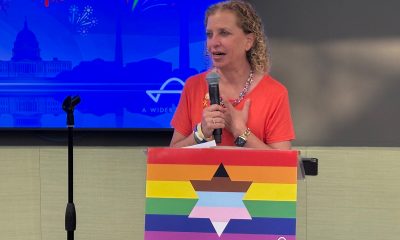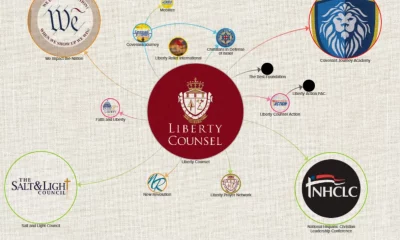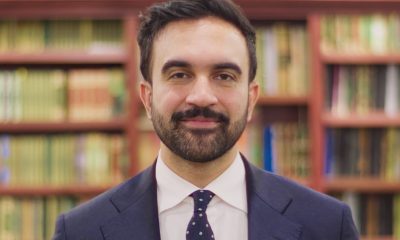Commentary
The war in Gaza impacts all of us and democracy too
ICJ case accuses Israel of committing genocide against Palestinians in enclave.

BY JULIE DORF | As a leader in the LGBTQI+ movement and co-chair of the U.S.-based foreign policy organization the Council for Global Equality (CGE), I am calling on my colleagues in the progressive foreign policy community to urgently discuss alternative policy solutions to our government’s support of the deadly war in Gaza and collectively begin demanding solutions that respect the dignity, rights and security for all.
The Council for Global Equality (CGE) works at the intersection of international human rights, U.S. foreign policy and LGBTQI+ communities. We primarily focus on influencing the U.S. government’s policies, programs and foreign assistance to do more good in the world, recognizing that our democracy typically only does the right thing when its citizens demand it — whether through elections or ongoing civic engagement by organizations such as ours. We also recognize that, deservedly or not, the United States wields outsized power in the world; as responsible citizens of this mighty country, it is therefore incumbent on us to actively engage and try to direct its power towards good. Our organizational principles include key tenets such as “freedoms abroad and freedoms at home are linked,” “democracy can only be rooted in secular, inclusive values,” “equal treatment is at the heart of human rights” and “one population’s rights cannot transcend those of another.” The full statement of principles is on our website.
When Hamas launched its terrifying attacks in southern Israel on Oct. 7, followed by Israel’s revengeful response in Gaza, I thought at first that this was not a CGE issue. As a progressive Jew, I was mostly consumed by my own relationship with the ongoing occupation and I feared for my friends in the region. I was horrified and heartsick, glued to Al Jazeera and other news sources. But I was not at all surprised by the attack, except perhaps that it had taken this long for a major uprising by Palestinians. I reached out to activists, friends and family in Israel, Palestine, Lebanon and Egypt. I felt no contradiction being equally upset by the loss of lives on all sides and holding multiple truths at once. Yes, Hamas is a terrorist organization that brutally murdered my people. Yes, Israel has been occupying, persecuting, and actively undermining a Palestinian state for its entire existence. And yes, the government of the United States and its Jewish community have both been enabling this horrible injustice for as long as I can remember. This crisis was just more of the same but on a much, much more painful scale.
My position on Palestine and Israel
I grew up in a staunchly Zionist environment, visited the region multiple times (Israel and the West Bank and Gaza,) and evolved through my human rights career into a proud Jewish anti-Zionist. I believe in the land of Israel being a vital, safe and sacred homeland for Jews and Muslims, as well as for Christians, Druze, Armenians, Samaritans and others.
I do not, however, believe in a Jewish supremacist state, which is the way that Israel’s current policies have been constructed, believing that only by having a majority of Jews in the country of Israel can it be a secure Jewish “homeland.” I believe it can and must be a secure homeland for different religions simultaneously. Indeed, if you’ve ever visited Jerusalem, you know it already is a homeland for Jews, Christians, Muslims and Armenians (albeit not safe.) Yes, Netanyahu is perhaps the most far-right authoritarian leader we’ve seen in Israel. But long-time policies from urban development, road construction and water to the separation wall and vast numbers of political prisoners, and other Israeli government policies have been constructed to maintain the supreme rights of Jews over Palestinians. These policies that are intended to maintain inequality by ethnicity are simply inherently incompatible with a genuine democracy. At this moment in the world, when democracy needs to be actively defended in so many countries, an exception clause for Israel is both indefensible and counterproductive.
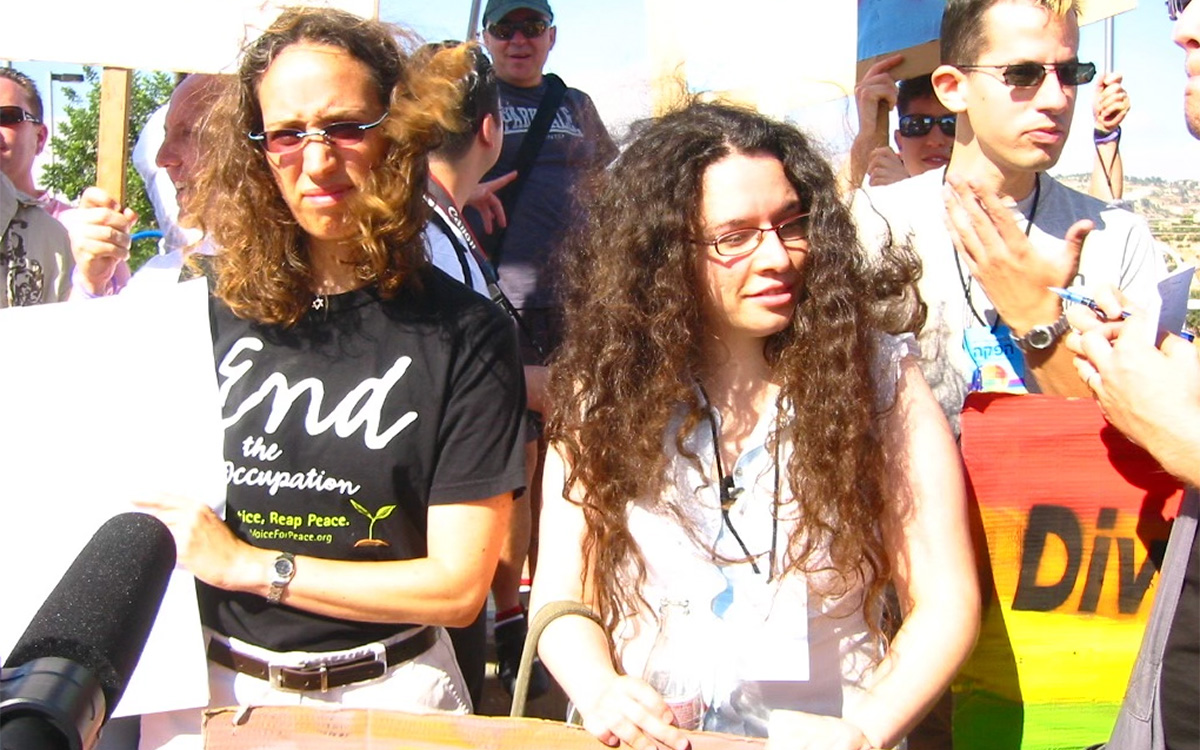
My political positions on Israel and Palestine have stirred up great pain and conflict in my family and community. But I have been committed to talking to my own people — in this case, American Jews — about these issues because that is where I can have the most influence to make change, however small that may be. Many progressive Jews — and particularly younger generations — share my beliefs but are afraid of being ostracized from their Jewish communities or families or being labeled a “self-hating Jew.” I know that I am a proud Jew.
Antisemitism and anti-Zionism
I am also no stranger to antisemitism — even working in the LGBTQI+ global movement, I have experienced my share of antisemitism. It mostly takes the form of microaggressions, such as comments about “your banker friends in New York” or “I won’t succumb to your Jewish guilt moves.” Then there was the moment when a presenter at a queer conference on closing civic space in Poland used a political cartoon from a local newspaper that had a picture of an Orthodox Jew with a huge nose, wearing a Star of David that said “NGO” on it — but didn’t recognize that NGO was overlaid on a profoundly antisemitic image. Or the time when someone posted a conspiracy theory full of lies that “co-religionist George Soros” was somehow connected West Bank settlement building on a large global queer listserv, and the moderator of the list told me that my concerns were unfounded and that “the post was not antisemitic.” And I’ll definitely never forget when an activist in Malaysia who had never met a Jew before asked to feel my head for my horns. At least they asked for consent!
Today’s genuine rise in antisemitism around the world is more overt and scary. I’m used to armed security guards at the entrances to Jewish institutions such as our schools, museums and synagogues to guard against the occasional violent act of antisemites. But this increased level of hate speech, online antisemitism, Nazis in public and murder threats are understandably terrifying my community. This is precisely why the distinction between this very real rise in antisemitic violence and anti-Zionist expression is critical to distinguish.
It is dangerous for Jews and others to conflate antisemitism with anti-Zionism because that conflation misdirects attention from genuine antisemitic violent threats and increases polarization in a year when our unity to protect democracy is more important than ever. Further, it is terrible for the freedom of thought and speech, undermining legitimate calls for justice for Palestinians and silencing people from expressing their true thoughts and reactions. All these things are harming U.S. foreign policy and making U.S. citizens less safe.
We can agree to disagree about the connotations of “from the river to the sea” or the word “intifada,” but it is not inherently antisemitic to wish for equality in that location or to desire a one-state solution to the conflict between the state of Israel and the stateless citizens of Palestine or to wish to organize peaceful resistance to oppression (such as the boycott, divestment and sanctions movement.) This is legitimate political discourse, essential to finding a peaceful solution to this ongoing conflict, whether that be a one-state, two-state, confederated or some other solution we haven’t yet imagined.
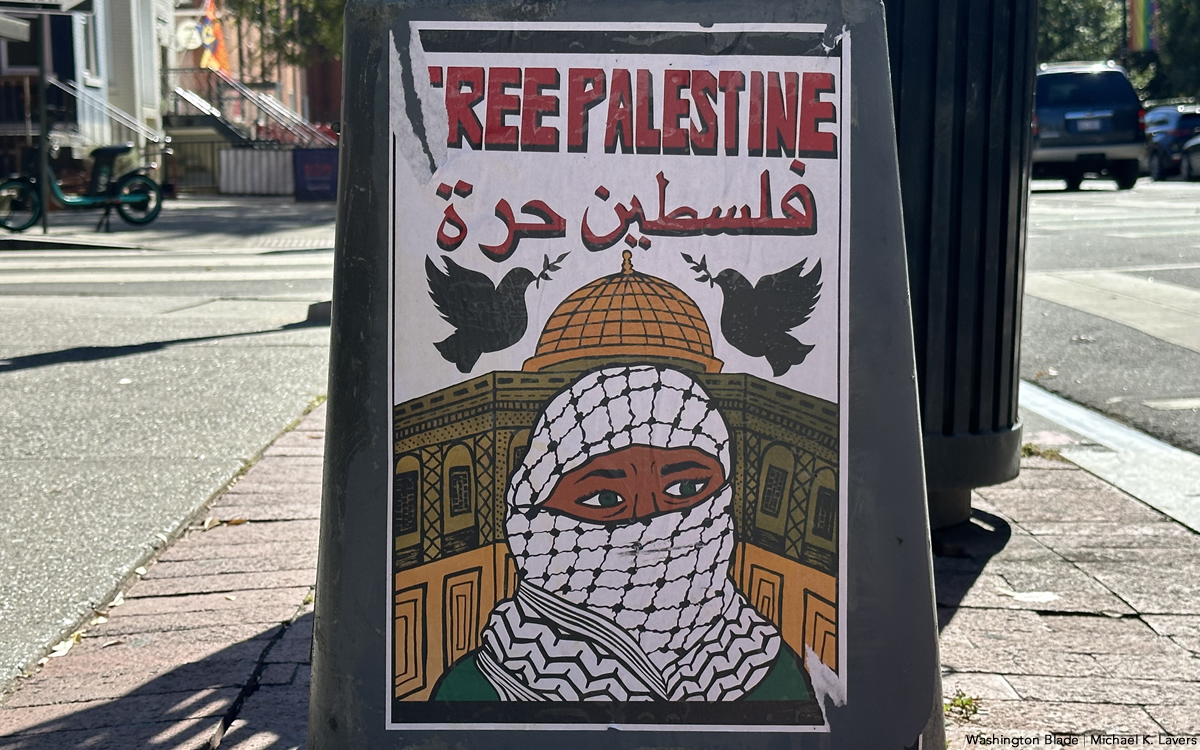
Further complicating matters, progressives tend to minimize antisemitism because of Ashkenazi white skin privilege and class privilege, whether real or imagined. Yet Eastern European Jews weren’t considered “white” for many decades, Sephardic Jews are still not considered “white,” and there is increasing visibility of Jews of color. Regardless of the color of our skin, we’ve not been part of any dominant culture for most of our existence as a people — until the creation of the Israeli state. But in the current leftist paradigm of “settler colonialism” as it applies to the State of Israel (which is, in fact, what the early founders of Israel called themselves), often the role of historical and current antisemitism is either dismissed or ignored. This is problematic and limits solidarity. It adds to the lopsided empathy that occurs in both directions and limits civil discourse and healing.
There is no doubt that antisemitism over time, and particularly the Holocaust, played a critical role in the creation of the state of Israel, as well as in the historical trauma and epigenetic fears that live inside so many of us Jews. That trauma was further inflamed by Hamas’ attack on Oct. 7, just as the trauma of the Nakba was reignited for Gazans when Israel’s counter-attacks began and 90 percent of Gazans were forced to leave their homes, regularly going without food. It might seem obvious that this sense of collective victimhood does not give license to victimize others, but it certainly creates a major blind spot in Jewish identity. It is overdue for Jews around the world — and especially in Israel — to update our story and live up to our stated values as a people committed to “Tikkun Olam,” or to repair the world. As painful as it is, we must take a hard look at the missteps in the history of Israel and rectify them urgently. We must face the current crisis and rise in antisemitism with the clarity that anti-Zionism is not synonymous with antisemitism. We must also be able to sit with the discomfort or sense of threat from anti-Zionist arguments or even chants, or genuine discourse about a different role for the U.S. vis-à-vis Israel, rather than reflexively labeling all of that antisemitic.
Legitimacy in global movements
So, when activists in the Middle East began asking queer groups to show up in solidarity with Palestine and, in particular, to join the calls for a ceasefire, I had no problem as a co-chair of CGE to craft a statement on behalf of our organization. It was not only consistent with our stated principles, but it was also a question of legitimacy for us in our global movement. What so many Americans do not quite understand is that much of the world considers Israel a pariah state; as such, the “special relationship” the United States maintains with a country considered akin to apartheid South Africa is very hard to explain or defend. Yet here in the United States, we get a totally different perspective, highly influenced by the commercial media, by mainstream Jewish community institutions (many of which are quite out of step with their own constituents, particularly younger people) and also by the strong forces of the intensely Zionist Christian right (Did you know that Christians United for Israel has more members than AIPAC?) And perhaps, as Peter Beinart posits, as Americans, we identify unconsciously with Israelis because we, too, do not wish to rectify our past treatment of Native Americans in our own founding of our country. This creates a grossly asymmetrical empathy for the “Israeli side” (which, by the way, is hardly monolithic) for many in the United States.
Yet, for many of us in the fields of international human rights, global development, or foreign policy, we engage regularly with colleagues outside of the United States who have a more balanced concern for the Palestinians. Indeed, we cannot do our work very effectively without such solidarity and trusted relationships. Consequently, it is very difficult to sustain an organizational position that justifies the levels of U.S. aid to Israel (over $3B annually,) particularly the extra $14.5B in military aid for their war on Gaza, some of it circumventing required congressional notifications, which everyone knows by now has overwhelmingly killed civilians and children and over 20,000 people. Then to see that with the U.S. government’s enormous investment, the Israeli military and intelligence could be so arrogantly incompetent, caught without any plan or reasonable response to the Oct. 7 Hamas attacks, makes that incredibly large investment even more questionable. And yet, most D.C. organizations still simply shy away from this issue.
Pinkwashing and impact on the LGBTQI+ movement
For the global LGBTQI+ movement, “pinkwashing” has further enraged many in queer communities across the globe. Pinkwashing is the promotion by the Israeli government (or any other government) of its pro-LGBTQI+ policies to intentionally distract from its human rights abuses against Palestinians (or other horrific rights abuses.) In truth, all the rights that have been disingenuously touted by the Israeli government to show a contrast to surrounding Arab states in the region were hard-fought and won by the country’s LGBTQI+ community itself through the courts, not simply handed to the community by the State of Israel. This has been a key part of the intentional campaign by the Israeli government to maintain an image that the country is more similar to Western democracies and, therefore, more deserving of their support.
But in many ways, it has backfired when it comes to LGBTQI+ communities and certainly alienated Israeli LGBTQI+ civil society from the global movement, and in particular from other LGBTQI+ organizations in the region. It is considered so taboo to be connected to Israel that no other Middle East or North Africa (MENA) representatives would show up to a queer MENA event if Israeli civil society were even invited. (And, yes, there are LGBTQI+ groups large and small in Jordan, Lebanon, Iraq, Iran, Tunisia, Morocco, etc.) Israel’s pinkwashing also helped spawn stronger queer support for Palestinians and for the BDS movement. A clear example of this pinkwashing continues now during the war, when the State of Israel’s official X (formerly Twitter) account showed an IDF soldier unfurling a rainbow flag in front of a tank in Gaza and another one, claiming to be “in the name of love,” in front of a destroyed village. For many of us, this was beyond offensive, it was stomach-churning.
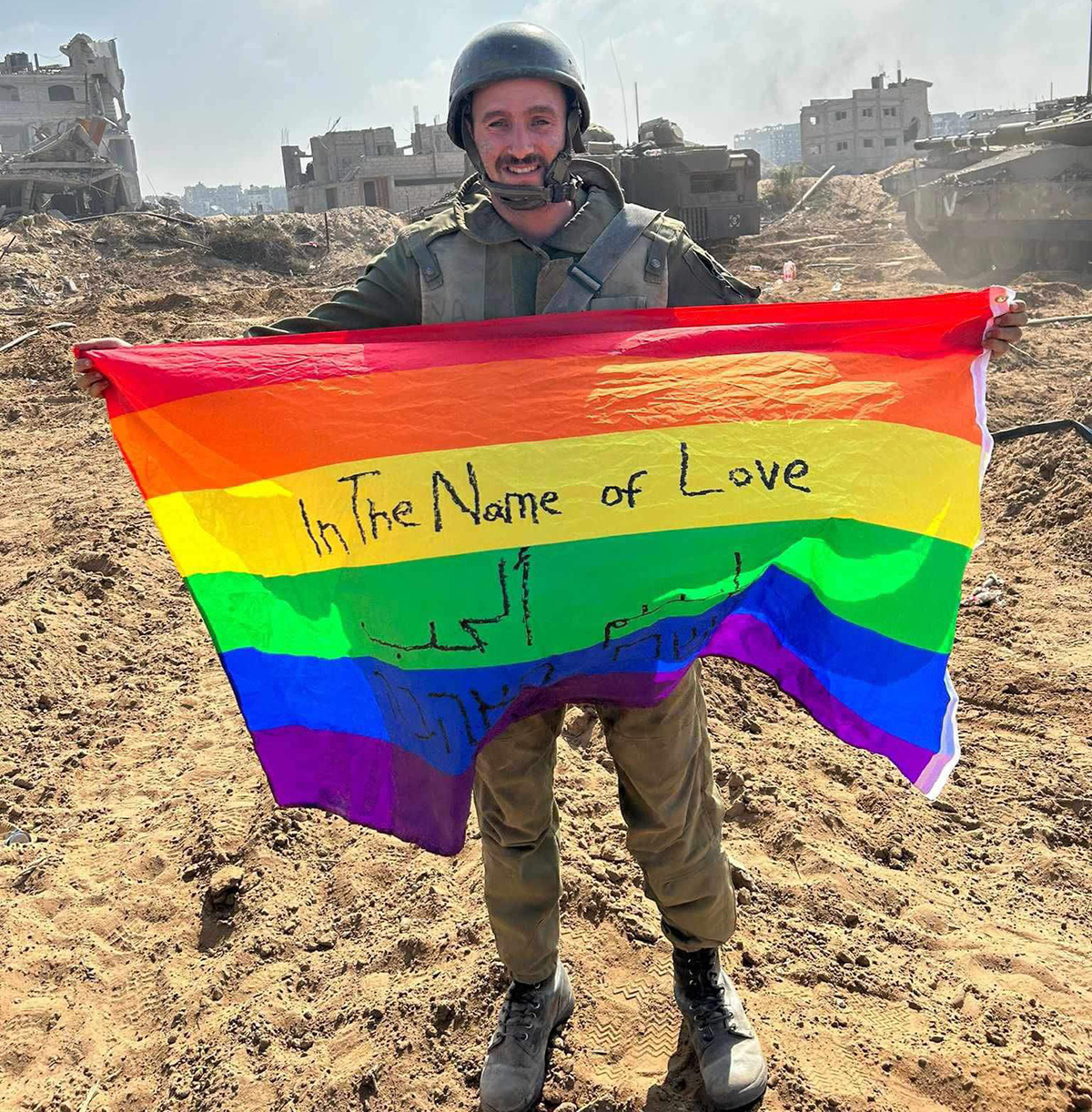
For all of these reasons, CGE issued our statement calling for a ceasefire in late October. Most of our organizational members were very pleased with its release, except for the ADL, which chose to end its membership in CGE over our differences on this issue. Human Rights Watch and Amnesty International, both long-standing CGE members, have strongly criticized this war, documenting war crimes and other human rights violations, both by the Israeli state against Palestinian civilians and by Hamas against Israeli citizens. But other than those large human rights organizations, the most vocal members of the foreign policy community in Washington have been the large humanitarian assistance providers, which have passionately argued for a ceasefire. The visible resistance by Jewish Voice for Peace and other progressive Jewish organizations, together with Palestinian rights organizations, have been the primary other civil society entities articulating a different vision for U.S. policy on Israel and Palestine. Between the street protests, potentially losing the next generation’s vote, and the upset from federal employees themselves, this does seem to be getting the Biden-Harris administration’s attention, forcing very small shifts toward using its leverage to reign in Israel’s military violence.
Where is the US foreign policy community?
So, where is the rest of the Washington foreign policy community? Clearly, others must have similar concerns for their credibility with partners around the world during this crisis and feel uneasy every day as the news appears. How can we not do better than this to hold our government accountable to our values of equality and justice? Where are the media watchdog organizations and why are they not challenging such asymmetrical coverage of the war? I understand that people are scared to “take a side,” to offend someone, to lose big donors and to lose legitimacy in the eyes of our U.S. government allies. God forbid we get canceled by saying the wrong thing or making a mistake.
But we must do better than that; we must have the courage to advocate for a more balanced U.S. policy on Israel and Palestine and to call on the Biden administration to be a more honest broker in the conflict. If foreign policymakers believe that the United States needs to be Israel’s best friend, to be a trusted nation they will listen to, then we certainly have paid our dues by now. We must leverage decades of expensive investments more strategically and effectively.
It is time for the progressive foreign policy community in the United States, together with principled Jewish organizations, Palestinian leaders and others sincerely invested in peace to come together to articulate a better way forward for U.S. foreign policy. We must demand conditions on U.S. aid, not just on ending illegal settlement building in the West Bank, but on actually dismantling settlements if the U.S.-stated policy goal of helping to create a Palestinian state is sincere. We must condition military aid appropriately to avoid its use in war crimes. We must demand and help secure the release of Palestinian leaders in Israeli prisons who could become the more legitimate, moderate leaders of the next iteration of the Palestinian Authority. This would undermine the Hamas movement far more effectively than the current military campaign is doing by offering better leadership options. We must demand the release of the Israeli hostages in Gaza and the Palestinian political prisoners in Israel. And we must end the immense blank check support of billions of taxpayer dollars to Israel by requiring a genuine restart of peace negotiations. These are just some of the policies that we should be advocating for – the point is that we need to have those debates as a matter of urgency within our own foreign policy communities in Washington.
As an LGBTQI+ U.S. foreign policy organization, we should be a part of those discussions, not just because queer Palestinians and queer Israelis are impacted, and not just because it’s urgently critical for the safety of all Palestinians and Israelis, but because, indeed, we are all impacted. Americans will be safer. Jews will be safer. Democracy might even be safer.
Julie Dorf is the co-chair of the Council for Global Equality.
Commentary
Defunding LGBTQ groups is a warning sign for democracy
Global movement since January 2025 has lost more than $125 million in funding

In over 60 countries, same-sex relations are criminal. In many more, LGBTIQ people are discriminated against, harassed, or even persecuted. Yet, in most parts of the world, if you are an LGBTIQ person, there is an organization quietly working to keep people like you safe: a lawyer fighting an arrest, a shelter offering refuge from violence, a hotline answering a midnight call. Many of those organizations have now lost so much funding that they may be forced to close.
One year ago this week, the U.S. government froze foreign assistance to organizations working on human rights, democracy, and development worldwide. The effects were immediate. For LGBTIQ communities, the impact has been severe and far-reaching.
For 35 years, Outright International has helped build and sustain the global movement for the rights of LGBTIQ people, working with local partners in more than 75 countries. Many of those partners are now facing sudden closure.
Since January 2025, more than $125 million has been stripped from efforts advancing the human rights of lesbian, gay, bisexual, transgender, intersex, and queer people globally. That figure represents at least 30 percent of yearly international funding for this work. Organizations that ran emergency shelters, legal defense programs, and HIV prevention services have been forced to close or drastically scale back operations. At Outright alone, we lost funding for 120 grants across nearly 50 countries. We estimate that, without intervention, 20 to 25 percent of our grantee partners risk shutting down entirely.
But this is not only a story about one community. It is a story about how authoritarianism works, and what it costs when we fail to recognize the pattern.
The playbook is not subtle
Researchers at Outright and partners across human rights and democracy movements have documented the same sequence playing out across sectors worldwide: governments defund organizations before passing restrictive legislation, eliminating the groups most likely to document abuses before abuses occur.
In December, CIVICUS downgraded its assessment of U.S. civic freedoms from “narrowed” to “obstructed,” citing what it called a “rapid authoritarian shift.” The message was unmistakable: independent organizations that hold power to account are under growing pressure, in the United States and around the world.
And the effects have cascaded globally. When one of the world’s largest funders of democracy support and human rights work withdraws, it doesn’t just leave a funding gap. It sends a signal to authoritarians everywhere: the coast is clear.
The timing is not coincidental. In the super election year of 2024, 85 percent of countries with national elections featured anti-LGBTIQ rhetoric in campaigns. Across the 15 countries we tracked, governments proposed or enacted laws restricting gender-affirming care, rolling back legal gender recognition, and censoring LGBTIQ expression. The defunding often came first. Governments know that if they can starve the movement, there will be no one left to document what comes next.
Why US readers should care
It may be tempting to see this as a distant crisis, especially at a moment when LGBTIQ rights in the United States are under real pressure. But this story is closer to home than it appears. American funding decisions often help determine whether organizations protecting LGBTIQ people abroad can keep their doors open. And when independent organizations are weakened, no matter where they are, the consequences do not stay contained. The same political networks driving anti-LGBTIQ legislation in the United States share strategies and resources with movements abroad. Global repression and domestic rollback are not separate stories. They are the same story, unfolding in different places.
LGBTIQ organizations are often the first target, but never the last
Why target LGBTIQ communities first? Because we are politically easier to isolate. The same playbook — foreign funding restrictions, bureaucratic harassment, banking access denial — is now being deployed against environmental groups, independent media, women’s rights organizations, and election monitors. When one part of our community is silenced, all of us become more vulnerable. What happens to us is a preview of what happens to everyone.
This is not speculation. It is documented history. In Hungary, the government restricted foreign funding for civil society before passing its “anti-LGBTQ propaganda” law. In Russia, “foreign agent” designations preceded the criminalization of LGBTIQ identity. In Uganda, funding restrictions on human rights organizations came before the Anti-Homosexuality Act. The pattern repeats because it works.
And yet, even as these attacks intensify, victories continue. In 2025, Saint Lucia struck down a colonial-era law criminalizing consensual same-sex intimacy after a decade of regional planning and coalition-building. Courts in India, Japan, and Hong Kong upheld trans people’s rights. Budapest Pride became the largest in Hungarian history — and one of the country’s biggest public demonstrations — despite a government ban. In Thailand, years of patient advocacy culminated in marriage equality becoming law in 2025, the first such victory in Southeast Asia.
These wins happened because our movement built the capacity to survive hostility. Legal defense funds. Documented evidence. Regional coalitions. Emergency response networks. The organizations behind these victories are precisely the ones now facing drastic funding cuts and even closure.
What we are doing and what we need
On Jan. 20, 2026, Outright International publicly launched Funding Our Freedom, a $10 million emergency campaign running through June 30, 2026. We have already secured over $5 million in pledges from more than 150 donors. But the gap remains enormous.
The campaign supports two priorities that must move together. Half of the funds go directly to frontline LGBTIQ organizations facing sudden shortfalls: keeping staff paid, maintaining safe spaces, securing legal support, and continuing essential services. The other half supports Outright’s global work: documenting abuses, training activists, and advocating for LGBTIQ inclusion at the United Nations and other international forums. This is how LGBTIQ people remain seen, heard, and defended, even when governments attempt to erase them.
We structured Funding Our Freedom this way because frontline support without protection is fragile, and global advocacy without frontline truth is hollow. Both must survive.
Funding Our Freedom is not charity. It is how we keep the global LGBTIQ movement alive when governments try to erase it.
A call to those who believe in equality and democracy
If you are part of the LGBTIQ community, this moment is personal. Whether you give, share this work, host a small fundraiser, or bring others into the effort, you become part of what keeps our global community connected and protected.
If you are an ally or simply someone who believes in fairness, free expression, and accountable government, this fight is yours too. The defunding of LGBTIQ organizations is not an isolated decision. It is a test case. If it succeeds, the same tactics will be used against every group that challenges power and defends vulnerable people.
We are not asking for sympathy. We are asking for commitment. The organizations now being forced to close are the ones that document abuses, provide legal defense, support people in crisis, and show up when no one else will. If they disappear, we lose more than services. We lose the ability to know what is happening and to respond.
Authoritarians understand this. That is why they target us first.
The question is whether the rest of us understand it in time.
Maria Sjödin is the executive director of Outright International, where they has worked for over two decades advocating for LGBTIQ human rights worldwide. Learn more at outrightinternational.org/funding-our-freedom.

January arrives with optimism. New year energy. Fresh possibilities. A belief that this could finally be the year things change. And every January, I watch people respond to that optimism the same way. By adding.
More workouts. More structure. More goals. More commitments. More pressure to transform. We add healthier meals. We add more family time. We add more career focus. We add more boundaries. We add more growth. Somewhere along the way, transformation becomes a list instead of a direction.
But what no one talks about enough is this: You can only receive what you actually have space for. You don’t have unlimited energy. You have 100 percent. That’s it. Not 120. Not 200. Not grind harder and magically find more.
Your body knows this even if your calendar ignores it. Your nervous system knows it even if your ambition doesn’t want to admit it. When you try to pour more into a cup that’s already full, something spills. Usually it’s your peace. Or your consistency. Or your health.
What I’ve learned over time is that most people don’t need more motivation. They need clarity. Not more goals, but priority. Not more opportunity, but discernment.
So this January, instead of asking what you’re going to add, I want to offer something different. What if this year becomes a season of no.
No to things that drain you. No to things that distract you. No to things that look good on paper but don’t feel right in your body. And to make this real, here’s how you actually do it.
Identify your one true priority and protect it
Most people struggle with saying no because they haven’t clearly said yes to anything first. When everything matters, nothing actually does. Pick one priority for this season. Not 10. One. Once you identify it, everything else gets filtered through that lens. Does this support my priority, or does it compete with it?
Earlier this year, I had two leases in my hands. One for Shaw and one for National Landing in Virginia. From the outside, the move felt obvious. Growth is celebrated. Expansion is rewarded. More locations look like success. But my gut and my nervous system told me I couldn’t do both.
Saying no felt like failure at first. It felt like I was slowing down when I was supposed to be speeding up. But what I was really doing was choosing alignment over optics.
I knew what I was capable of thriving in. I knew my limits. I knew my personal life mattered. My boyfriend mattered. My family mattered. My physical health mattered. My mental health mattered. Looking back now, saying no was one of the best decisions I could have made for myself and for my team.
If something feels forced, rushed, or misaligned, trust that signal. If it’s meant for you, it will come back when the timing is right.
Look inside before you look outside
So many of us are chasing who we think we’re supposed to be— who the city needs us to be. Who social media rewards. Who our resume says we should become next. But clarity doesn’t come from noise. It comes from stillness. Moments of silence. Moments of gratitude. Moments where your nervous system can settle. Your body already knows who you are long before your ego tries to upgrade you.
One of the most powerful phrases I ever practiced was simple: You are enough.
I said it for years before I believed it. And when I finally did, everything shifted. I stopped chasing growth just to prove something. I stopped adding just to feel worthy. I could maintain. I could breathe. I could be OK where I was.
Gerard from Baltimore was enough. Anything else I added became extra.
Turning 40 made this clearer than ever. My twenties were about finding myself. My thirties were about proving myself. My forties are about being myself.
I wish I knew then what I know now. I hope the 20 year olds catch it early. I hope the 30 year olds don’t wait as long as I did.
Because the only way to truly say yes to yourself is by saying no first.
Remove more than you add
Before you write your resolutions, try this. If you plan to add three things this year, identify six things you’re willing to remove. Habits. Distractions. Commitments. Energy leaks.
Maybe growth doesn’t look like expansion for you this year. Maybe it looks like focus. Maybe it looks like honoring your limits. January isn’t asking you to become superhuman. It’s asking you to become intentional. And sometimes the most powerful word you can say for your future is no.
With love always, Coach G.
Gerard Burley, also known as Coach G, is founder and CEO of Sweat DC.
Commentary
Honoring 50 queer, trans women with inaugural ‘Carrying Change’ awards
Naming the people who carry our movements forward

Dear friends, partners, and community:
We write to you as two proud Black and Brown queer women who have dedicated our lives to building safer, bolder, and more just communities as leaders, organizers, policy advocates, and storytellers.
We are June Crenshaw and Heidi Ellis.
June has spent almost 10 years guiding the Wanda Alston Foundation with deep compassion and unwavering purpose, ensuring LGBTQ+ youth experiencing homelessness have access to stability, safety, and a path forward. Her leadership has expanded housing and support services, strengthened community partnerships, and helped shift how Washington, D.C. understands and responds to the needs of queer and trans young people. In her current role with Capital Pride Alliance, June advances this work at a broader scale by strengthening community infrastructure, refining organizational policies, and expanding inclusive community representation.
Heidi is the founder of HME Consulting & Advocacy, a D.C.–based firm that builds coalitions and advances policy and strategy at the intersection of LGBTQ+ justice and racial equity. Her work spans public service, nonprofit leadership, and strategic consulting to strengthen community-driven solutions.
We’re writing because we believe in intentional recognition — naming the people who carry our movements forward, who make room for those who come next, and who remind us that change is both generational and generative. Too often, these leaders do this work quietly and consistently, without adequate public acknowledgment or what one might call “fanfare,” often in the face of resistance and imposed solitude — whether within their respective spaces or industries.
Today, we are proud to introduce the Torchbearers: “Carrying Change” Awards, an annual celebration honoring 50 unstoppable Queer and Trans Women, and Non-Binary People whose leadership has shaped, and continues to shape, our communities.
This inaugural list will recognize:
- 25 Legends — long-standing leaders whose decades of care, advocacy, and institution-building created the foundations we now stand upon; and
- 25 Illuminators — rising and emerging leaders whose courage, creativity, and innovation are lighting new paths forward.
Why these names matter: Movement memory keeps us honest. Strategy keeps us effective. Recognition keeps us connected. By celebrating both Legends and Illuminators side by side, we are intentionally bridging histories and futures — honoring elders, uplifting survivors, and spotlighting those whose work and brilliance deserve broader support, protection and visibility.
Who will be included: The Torchbearers will represent leaders across a diverse range of sectors, including community organizing, public service, sports, government, entertainment, business, education, legal industry, health, and the arts — reflecting the breadth and depth of queer leadership today. They include organizers providing direct service late into the night; policy experts shaping budgets and laws; artists and culture workers changing hearts and language; healers and mutual-aid leaders; and those doing the quiet, essential work that sustains us all.
Intersectionality is our core commitment: identity in its fullness matters, and honorees must reflect the depth, diversity, and nuance of queer leadership today.
How you can engage: Nominate, amplify, sponsor, and attend. Use your platforms to uplift these leaders, bring your organization’s resources to sustain their work, and help ensure that recognition translates into real support — funding, capacity, visibility, and protection.
We are excited, humbled, and energized to stand alongside the women and non-binary leaders who have carried us, and those who will carry this work forward. If history teaches us anything, it’s that the boldest change happens when we shine light on one another, and then pass the flame.
YOU CAN MAKE A NOMINATION HERE
June Crenshaw serves as deputy director of the Capital Pride Alliance. Heidi Ellis is founder of HME Consulting & Advocacy.

